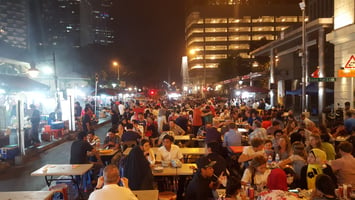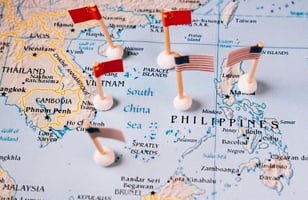How China's cybersecurity laws could backfire Chinese legislation seeking data from cars on...
Kusu News 18-Jul-2022
China’s big GDP miss in Q2 may be the bad news needed to spur more policy support
15-July-2022 The Business Times
CHINA’S economic growth for the second quarter came in at below consensus estimates, prompting some economists to cut again their full-year projection for the world’s second-largest economy, even as the big miss may be the bad news needed to spur more policy support.
On Friday (Jul 15), the National Bureau of Statistics (NBS) said the economy expanded 0.4 per cent from the year before in the second quarter. This is the lowest rate of growth since the first 3 months of 2020, when China effectively shut down to fight the virus, and its economy shrank for the first time in 28 years.
NBS spokesperson Fu Linghui told reporters that it was not easy to maintain a positive growth: “Looking at the next stage, the risk of stagflation in the global economy is rising.” Stagflation is a mix of slow growth, high unemployment and rising prices.
Big G20 year for Indonesia
This year’s G20 is being held in Indonesia, yet it is developments some 6,000 miles away in Ukraine that are most shaping the multilateral body’s 2022 agenda.
14-July-2022 The Business Times
THIS Friday and Saturday, G20 finance ministers meet in Bali after their foreign minister counterparts convened last week. Tensions over Moscow’s invasion boiled over in that latter session with Russian Foreign Minister Sergei Lavrov walking out of meetings at least twice, and there was none of the usual customary group pictures of the so-called ‘G20 family’ taken.
With the longevity and outcome of the Ukraine crisis unclear, this year’s G20 events have the potential to become the most important since the 2009 meeting in London during the storm of the international financial crisis. While Indonesia is one of the club’s least prominent states, Indonesia’s President Joko Widodo is determined to try to stamp his mark and is engaging in extensive shuttle diplomacy, including to Moscow to see President Vladimir Putin this month.
According to Widodo, Putin will not attend this year’s leadership summit in person. However, other presidents and prime ministers will do so from China, India, Japan, Australia, Brazil, the United Kingdom, Saudi Arabia, South Africa, Turkey, France, Germany, Italy, Canada, South Korea, Argentina, Mexico, the European Union (EU), and the United States. Collectively, these powers account for some 90 per cent of global gross domestic product (GDP), 80 per cent of world trade, and around 66 per cent of global population.
Priest begins protest outside Hong Kong prison against detentions of activists
14-July-World News Times
About 200 people have been arrested under the national security law since China imposed it on the former British colony in June 2020 to quell the 2019 unrest. Demonstrations have been small and rare since the law came into force, in part due to government COVID-19 restrictions on public gatherings.
While international critics, including some governments, have warned the law has been used to effectively silence opposition politicians, civil society and some media groups, both Chinese and Hong Kong officials have said repeatedly the law was needed to restore stability after months of sometimes-violent demonstrations.
Hong Kong officials have said the law is enforced according to evidence and not based on a person or group’s background.
The top US diplomat in Hong Kong on Monday warned that the “crude and chilling” use of law was threatening Hong Kong’s long-standing role as a financial centre.
The national security arrests condemned by Washington include that of another important Catholic figure in Hong Kong, 90-year-old Cardinal Joseph Zen.
Indonesia Temporarily Stops Sending Migrant Workers to Malaysia
15-July-2022 TheIndonesia.id
The Indonesian government has decided to temporarily stop sending migrant workers to Malaysia from July 13 after the destination country was found to have breached bilateral agreement on the placement of migrant workers.
Director of citizen protection at the Ministry of Foreign Affairs Judha Nugraha said on Thursday, July 14, that the decision was made after representatives from the Indonesian government had found a number of evidences that Malaysia continued to employ the “maid online” system (SMO), which is a mechanism not included in a memorandum of understanding (MoU) between the two countries.
“The SMO particularly makes Indonesian migrant workers vulnerable to exploitation because the mechanism is not in line with Law No. 18/2017 on the Protection of Migrant Workers,” Nugraha said, as reported by Antara. “Eventually, our migrant workers depart illegally.”
Upon the finding, the Indonesian government took a step to temporarily halt the placement of Indonesian migrant workers to Malaysia until Malaysia can provide clarification and reaffirm its commitment to stop the use of SMO.
Marcos flexing muscles in the South China Sea
Philippine leader reasserts Manila’s 2016 arbitral award over China in disputed sea in clearest sign yet of a policy reboot
13-July-2022 Asia Times
MANILA – The newly installed Ferdinand Marcos Jr administration has emphatically invoked international law on the sixth anniversary of its arbitration award victory against China over their competing claims in the South China Sea, marking the latest sign of a major strategic reboot in Manila’s policy towards Beijing.
That emerging reboot stands in stark contrast to the stance of outgoing president Rodrigo Duterte, who repeatedly questioned the value of the historic arbitral ruling at The Hague in favor of the Philippines and underscored his willingness to “set aside” the award in favor of warmer ties with Beijing.
“The award and the United Nations Convention on the Law of the Sea (UNCLOS) are the twin anchors of the Philippines’ policy and actions on the [South China Sea],” newly appointed Foreign Affairs Secretary Enrique Manalo said on the 6th anniversary of the pivotal ruling.
Western companies face ‘existential crisis’ as fears grow of Chinese invasion of Taiwan
18-Jul-2022 Intellasia | The Telegraph |
Days after the Ukraine conflict erupted, Apple, BMW, McDonald’s and other Western giants lined up to announce they were quitting Russia in protest.
“This moment calls for unity, it calls for courage,” declared Tim Cook, Apple’s chief executive.
That it only caused a relatively small financial hit must also have helped. The decision reportedly cost the iPhone maker less than 1pc of its global sales, while some foreign businesses, including France’s Renault, chose to sell off their Russian operations for a symbolic one rouble. Oil giant Shell, which made almost $300bn (GBP 254bn) in sales last year, said its losses would not top $5bn.
Yet experts fear another diplomatic crisis will soon be looming where the calculation will not be so simple: a forced Chinese subjugation of Taiwan.
The independent island state of 23 million people is considered a breakaway province by Beijing, with President Xi Jinping having vowed to bring it under communist control no later than 2050.
Whether attempted with military force or other means, this would pose a nightmare scenario for boardrooms who have spent years and vast sums trying to woo the dragon.
Many of the West’s biggest businesses take a huge chunk of their profits from China, dwarfing what was at stake in Russia, and will be far more reluctant to give them up.
Apple made $68bn or 19pc of its revenues in Greater China last year, while one in three German cars are reportedly sold in the mainland. AstraZeneca, the British drugs giant, now relies on China for 16pc or $6bn of its annual sales.
-1.jpg?width=146&height=50&name=Kusu%20(1)-1.jpg)



